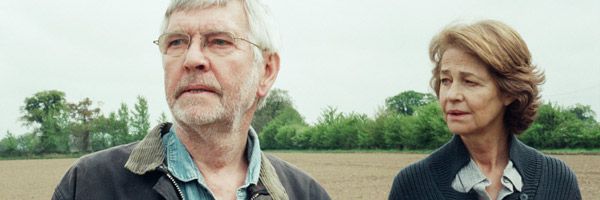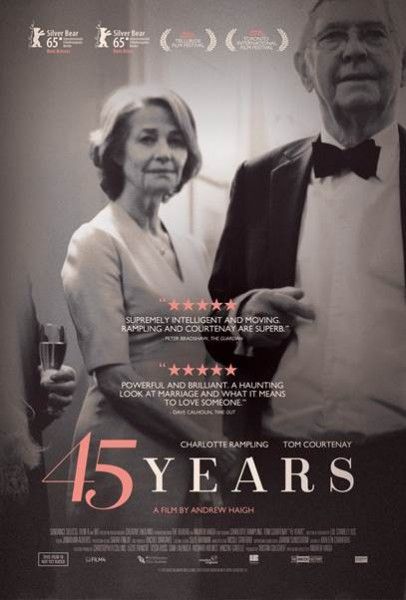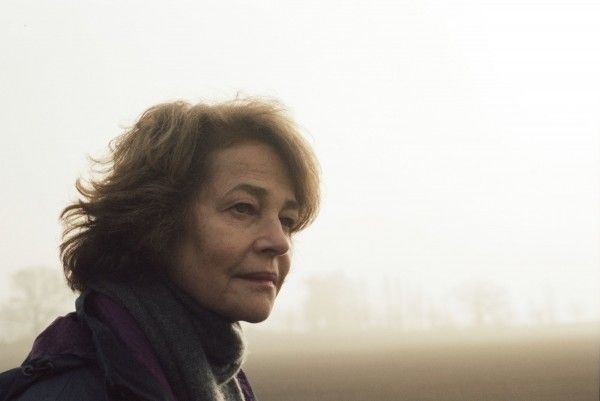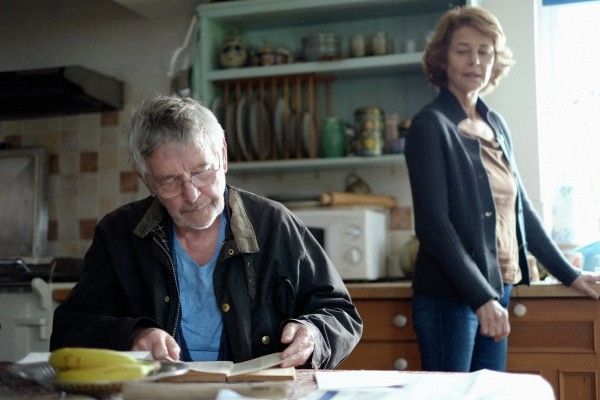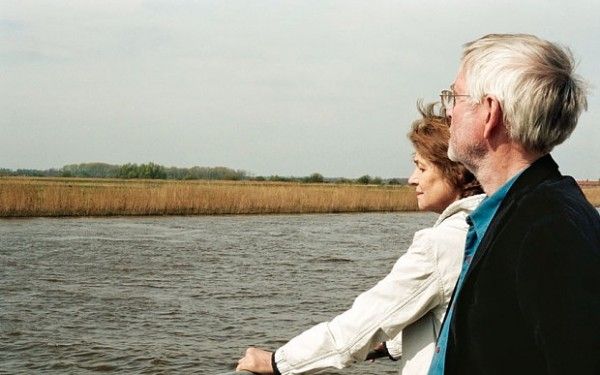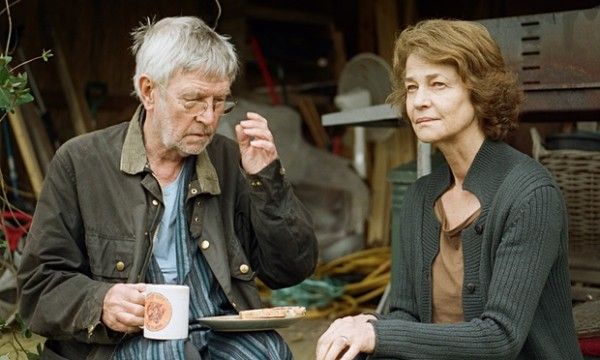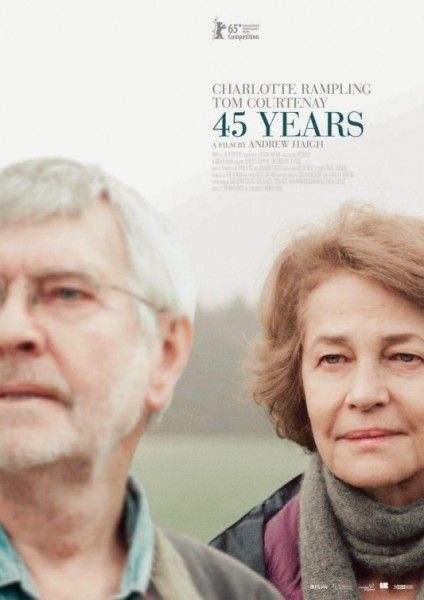In his latest film, 45 Years, acclaimed filmmaker Andrew Haigh turns a riveting short story by David Constantine into an emotional tour-de-force featuring superb performances by Charlotte Rampling and Tom Courtenay. The romantic drama takes a fresh look at relationships, old age, and forgiveness when past pain and jealousy unexpectedly reemerge on the eve of Geoff (Courtenay) and Kate’s (Rampling) 45th wedding anniversary. Haigh captures with poignant accuracy the emotional landmines that threaten to destroy the strongest bonds of an apparently stable marriage and cause both parties to look back and wonder if they made the right choice.
In an exclusive interview, Haigh talked about the film’s central theme of the past breaking through into the present and disrupting a seemingly solid relationship, the ways he expanded the short story and the themes at the heart of it, his decision to make the story more contemporary and tell it from the female perspective, how the actors surprised him by turning a line he’d written into something that suddenly went many levels deeper and brought something to life he hadn’t expected, his directing style using long takes and two-shots to draw the audience in, shooting the film in order so that the actors knew where they were emotionally, and more.
Check it all out in the interview below:
How did this project first come together for you?
ANDREW HAIGH: I was finishing editing my last film, Weekend, and I read the short story. A publisher had sent me a collection of short stories. It’s a very short story, but it really stuck with me, this central idea of this past breaking through into the present and disrupting a seemingly stable relationship. It came to me then, and I put it aside and wasn’t sure how it would be possible to turn into a film, because it’s so small and concise and it was told from the male perspective mainly in the story. I think once I started becoming interested in the idea of telling it from the female perspective, from Kate’s perspective, it opened up the story a bit for me and then I realized that it could be a film.
How did you find ways in your adaptation to expand David’s short story and the themes featured in those few pages?
HAIGH: The couple is actually in their eighties in the original story and the past story is set during the Second World War. One of my first big changes was changing that a little bit, so lowering the ages, making it feel more present and contemporary, and having the past being set in the sixties. Thematically, that made more sense to me. It was a story about essentially people looking back and thinking about the person they wanted to be when they were younger and what their life has actually turned out to become. That’s an interesting thematic thing for me. Then, it was just about widening the story. I added the whole idea of the anniversary party. That’s not in the short story. So, giving it some kind of structure, which is a very strange kind of ticking bomb, that’s just ticking there very, very quietly underneath the film. It was about finding ways to expand those themes at the heart of it.
What was it about the story that really resonated with you?
HAIGH: I think it’s just this idea. I’m really interested in how we understand our identity through the relationships we have, how important they become to understanding who we are and what we want. That was the key to it. I find the sadness of the story is that something can throw you off balance. When you’re thrown off balance, everything can start to gently tumble away – your understanding of what your life has been, what your relationship has been, who you wanted to be, how you’ve ended up. It’s all of those really deep existential questions that you suppress and hide for most of your life. Then, if something triggers them to come up, it can be a really terrifying, daunting thing for anybody.
Charlotte and Tom’s performances in this are terrific. I’m wondering what it was like working with these two icons of British cinema?
HAIGH: It was just like a dream where you hope that you can get people like that to be in your film. When they both said yes, it was incredible. They’ve got so much experience, but at the same time, they’re still looking to do new things and explore new things. So, it was a really nice, collaborative process. It was oddly not intimidating. They’ve both very lovely people that were dedicated to doing the best we could all do. It was like each day you’d go into work. We didn’t rehearse or anything. It was like trying to find the most truthful way of doing something. Both Tom and Charlotte had committed to digging deep and finding those moments.
What kind of preparation did you do with them prior to the start of shooting?
HAIGH: I spent a little bit of time with both of them. I spent two days with Charlotte, and we talked about everything, not even necessarily about the script. It was almost like talking around the script, talking about our lives, and what we feel the story means, and how it resonates with us. You’re just in those moments trying to connect with the actor or the actress to try and understand if you both know what you’re trying to do. I did that with Charlotte. I did that with Tom. Then, we spent a day together. We read through the script once, talked about a few things. They went for a coffee, and then we started shooting. That was it really. No rehearsals as such. It was more just about both of us trying to understand what it is that we were going for.
Was there anything that Tom and Charlotte brought to their performances that surprised you?
HAIGH: It’s always in those small moments that they bring something that surprises you. It’s little details and little gestures and turning a line that you’ve written into something that suddenly goes ten levels deeper that will bring something to life that you hadn’t expected. They do that every day. Acting is so incredible and mysterious to me. You just want to get the best actors you can, and you want to watch them and help them when they need help, and then let them loose when they don’t need help.
Can you talk about your directing style? Was it a deliberate choice to use long takes to let the action play out and draw the audience in, and then two-shots instead of close-ups to avoid chopping up the actors’ performances in the edit?
HAIGH: Absolutely. It was like that was always going to be the key. I love the idea of things unfolding in front of your eyes rather than being forced through edits. I also think you’re making a subconscious agreement with the audience that they have to engage and they have to work a little bit. You’re forcing them to look around the frame. You’re forcing them to be looking for things, searching for things. I love that engagement with an audience, because if you can do that, it allows them to get deeper into the material and put themselves into the material a little bit more. So, I love that. Also, I just love seeing two people in a frame, especially when it’s about a relationship. I want to see them engaging with each other, rather than it just being close-ups, and you cut between the two forcing that emotion.
Did you give them a lot of latitude to improvise within certain scenes?
HAIGH: I always like to think of it as you have the words, and then, if they want to embellish something in the moment or change something, then if it feels right, it feels right. Even though I wrote it, and the script is the other side of me, and now I’ve got my directing hat on, it’s like if Tom wants to throw something in there or change something, or more importantly, remove things. We would do a scene, and we would think, you know what, I don’t really think we need that line. Let’s take it out. Let’s get rid of that. I’m constantly trying to hone it down to the minimum that it needs. It’s almost like all of us, you and the actors, are in that process together.
There are many wonderful scenes, but two stand out where you really see the characters’ vulnerability. One is the sex scene. The other is at the party when Kate is left standing by herself after Geoff walks away at the end of the dance. How did you work with the actors to make both those scenes so powerful?
HAIGH: Both those scenes are absolutely key. It’s almost like the two scenes where they try to reconnect and are unable to in both those moments. If they had managed in that moment to reconnect, things would turn out differently. We all knew they were very pivotal scenes. I tried to do them both in the simplest but most penetrating way that I could. Both actors were completely committed in both those moments. The final scene, which is a long sequence, was the first thing I thought about when I was writing the script. Actually the end was always the point I knew I wanted to get to. I think ends are the most important thing. If you get that wrong, then the film doesn’t work. You have to make that ending work. You want people to leave the cinema remembering the ending even if they‘ve forgotten everything else. It’s funny. You’re building up to that ending, to me. That’s what it is. If you get it wrong leading up to that, the ending won’t have an effect. But if you can get it all as right as you can, then the ending will absolutely work. For the ending, we did it a bunch of times. There wasn’t much that I needed to say to Charlotte, because she knew what she had to do. She knew what it was. We shot the film in order so it was the last thing we shot as well. So, she knew where she was emotionally. I remember her saying, “Look, I might cry. I might not cry. I’m just going to see what happens in the moment. I’m going to try and be truthful to that.” I feel like that’s why it’s so powerful is because she’s there. She’s in that moment.
Were there any surprises during production? Is there anything you wish you’d known on day one?
HAIGH: Oh, interesting! There’s probably nothing I wished I had known, but it always changes. There’s definitely scenes that we had in the script that we took out. I think that’s the thing. It’s like you never really know what you’re going to need in a film. That’s the weird thing. You can become entirely convinced that there’s a certain scene that is fundamental, and then weirdly, you get in the edit and you’re like, “I don’t even need that scene,” and you take it out. Then, there’s other scenes that you think, “Well I’m probably not going to need that,” and then you’re like, “Well, that’s everything! That scene is so important. I’m so glad we shot that scene.” It’s always really interesting what turns out to be the most important thing. You never know that until you’re in the middle of doing it.
How long was your first cut?
HAIGH: The first cut was probably a little under two hours, and it ended up being an hour and a half. I shot a lot of other scenes of silence, I suppose, with Charlotte doing other things, but you want to pick the moments that you fundamentally need to tell the story. For a film like this that isn’t plot driven, you don’t want to outstay your welcome too much. It was about trying to find do I need that scene? Is it fundamental that I have that scene? So, some of the scenes we removed.
How does the final film compare to what you originally envisioned?
HAIGH: (laughs) That’s such a hard question. It’s so weird, because you have something in your mind that’s like this weird thing that doesn’t really exist, but it has something. Then, in the end, the film is really different to what you have in your mind. But when I can actually watch it without being like, “Oh my god, this is the film that I made,” it has the same emotional effect that I wanted it to have as what it had in my head. So, that’s the key. It’s like things are different and things have changed, but it has the emotional feeling I wanted it to have. That’s the key to me. I know roughly how I want something to feel, and I feel like the film feels like how I wanted it to feel.
One of the central themes this film explores seems inspired by the Robert Frost poem, The Road Not Taken. In your own life, have you ever looked back and wondered what would have happened if you’d gone in another direction or done something differently?
HAIGH: Luckily, at this moment anyway, I feel like my life seems to have gone in a pretty good direction. So, I feel quite lucky that it’s gone down in those directions. But there was so much randomness to it. I know, for me, being in this position now is hard work and all that, but it’s also being in the right place at the right time and a hell of a lot of luck being in a certain situation. It’s very difficult. When you look back at your life, you can see that things have happened that you know so easily could not have happened if you’d been in a different place. If I hadn’t gone out that night, I would not have met the person that I’ve now spent ten years with. It’s all of those very, very strange things in life, and I think if you focus in on them intently, it can be very, very disconcerting, and everything, as I said before, can crumble apart.
How do you feel about the Oscar buzz this film has been generating?
HAIGH: It’s amazing and lovely and fantastic that people are even thinking the film has those chances. I love the idea that Charlotte might get nominated. That would be incredible and I would be so over the moon. I think she deserves it. She’s had an amazing career, and I would love to see it. I think if it happens, it’s amazing. But more than anything, you make a relatively small film and all you want is for people to see it. What this does is it allows people to hear about the film and hopefully go and see it. That is also amazing regardless of whatever happens with big awards.
What are you working on next that you’re excited for audiences to know about?
HAIGH: I’m working on another film that I will hopefully make next summer. It’s set in Portland, Oregon. It’s based on a novel called Lean on Pete by a writer named Willy Vlautin. He’s an American writer. That’s coming together, I think. Nothing’s ever definitely going to happen until you’re on the first day and you’re shooting, but it looks like it’s going to come together. I suppose it’s larger in scale than what I’ve done before. It’s not so much a relationship drama, but it’s still looking at similar kind of themes that I’ve been interested in from the beginning. It hasn’t been cast yet. We’re still in slightly early days.
45 Years opens in limited release in theaters on December 23rd.

